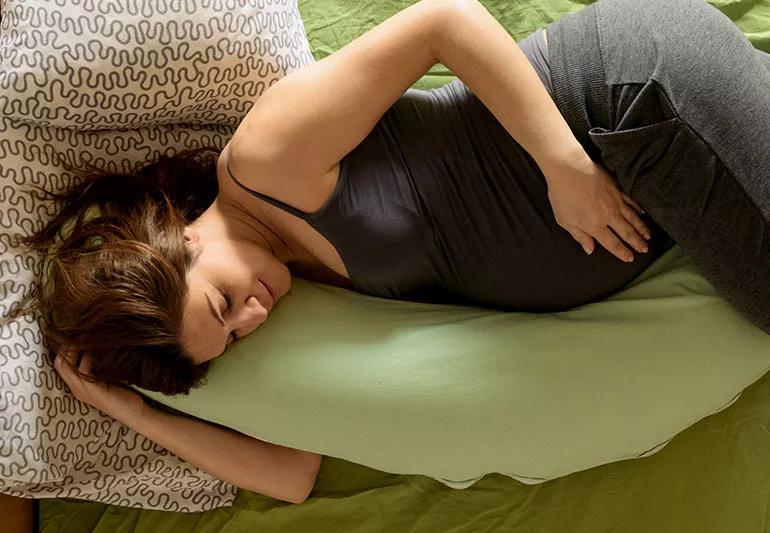Newborns have a certain reputation for keeping people up at odd hours with late-night feedings — but the sleepless nights can begin long before your baby arrives.
Advertisement
Cleveland Clinic is a non-profit academic medical center. Advertising on our site helps support our mission. We do not endorse non-Cleveland Clinic products or services. Policy
Figuring out how to get better sleep during pregnancy is not just important for your energy and mood. Pregnant women who get less sleep are more likely to have complications, according to sleep disorders specialist Sally Ibrahim, MD.
Find out what sleep disrupters are common throughout your pregnancy, as well as ways to get better rest.
Sleep by trimester
First trimester: Women tend to crave a significant amount of sleep while the placenta grows. Don’t be surprised if you feel sleepier overall, need to go to bed earlier and take naps. At this stage, the best thing you can do is to give into this urge, and get the rest your body needs.
Second trimester: The amount of sleep normalizes to the amount you needed before your pregnancy. But, as the baby and abdomen grow, there may be things that start to effect sleep, such as getting up and using the restroom.
Third trimester: Tiredness can come from poor quality sleep. Women tend to have less quality sleep due to factors such as:
- Back pain
- Baby kicks
- Leg cramps
- More frequent urination urges
- Substantial weight gain
- Congestion associated with late-term pregnancy
8 tips to help you get better sleep
Although it’s impossible for women to avoid many of the things that limit sleep during pregnancy, there are ways to get more (and better) rest:
- Develop a relaxing bedtime routine.
- Keep a regular bed and wake time.
- Avoid electronics for at least an hour before bedtime. If that’s not possible, turn down the screen’s brightness and avoid bright light.
- Limit caffeine in your diet.
- Relieve stress with exercise, yoga, mindfulness meditation or massage therapy.
- Sleep on your side. You may need a maternity pillow to support your back and knees.
- Limit breathing problems by elevating your head when you sleep.
- Stay well-hydrated to help reduce leg cramping.
Sleep disorders in pregnancy
Sleep disorders may start or worsen during the course of pregnancy. “Someone might not have these conditions before pregnancy, and they might develop during any trimester but especially by the end of pregnancy.” Sleep problems during pregnancy are not inevitable. They can, and should be addressed
Restless leg syndrome: If a woman has restless leg syndrome (RLS), it may get worse during pregnancy. The condition also may appear for the first time. Once RLS shows up, it is more likely to recur in later pregnancies. However, symptoms return to normal (for pre-existing cases) or disappear (for new cases) moments after delivery.
Sleep apnea: Sleep apnea is particularly dangerous for pregnant women.
Research shows negative effects for both the mother and for fetal development. The full extent of the problem isn’t fully known yet, but there is substantial evidence pointing to the association of sleep apnea with:
- Gestational diabetes
- Pre-eclampsia or pregnancy-induced hypertension
Talk to your doctor if you continue to struggle to get enough sleep. They can help pinpoint the cause and offer more tips to overcome it.


